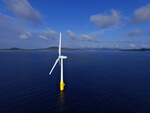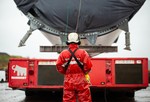11/11/2008
USA - Potential of wind power tested at school
A 60-foot transmission pole now decorates the lawn at Georgetown High School, and it could represent the future of wind energy in coastal communities.
Santee Cooper installed the pole Tuesday, and about 20 Georgetown High School science students will collect and analyze the data from the sensors during the next three to six months that will be used to determine the feasibility of putting in a wind turbine at the school in 2009.
"I think it's wonderful," said Principal Michael Cafaro. "With our society exploring alternate means of energy such as solar and wind, it is very, very important. And we need to take advantage of what's available. In our area here, we have wind coming in off the bay."
The pole is equipped with two wind sensors that will measure wind speed, direction and frequency to see if the site can sustain 8 mph winds, which could support a 1.8 kilowatt wind turbine.
The energy generated by a 1.8 kilowatt turbine could power a refrigerator or television, said Eric Boessnick, an engineer with Santee Cooper.
It cost about $5,000 to install the transmission pole, which was recycled from a utility poles, Boessnick said.
The program is a partnership between Santee Cooper, Coastal Carolina University and the Savannah River National Laboratory.
The experiment is also a great way to incorporate real world applications with classroom learning, Cafaro said.
"This parallels with our High Schools That Work initiative," Cafaro said. "It's making learning real, making learning relevant. Here is a science class that has taken and approached a problem: our energy crisis."
Cafaro said Environmental Science teacher David Wylie is pairing the wind experiment with an energy audit of the school. Students will be checking classrooms to see how many televisions are turned off and whether light switches are turned off, Wylie said.
Wylie said the students will start collecting data from the Santee Cooper transmission pole in about two weeks.
"We are absolutely integrating it into math and science classes," Wylie said. "Now they can see what wind energy is all about. It's a very big deal that Georgetown has this going on. Now, students are visually seeing that there is different forms of energy available. Seeing is believing. It's not just me showing photos in a classroom."
The pole is the first of four that are planned to be installed at schools in coastal areas of the state in Santee Cooper's coverage area. A second pole will go up at Coastal Carolina University's Atlantic Center later this year. The company is still deciding on the last two schools.
"Santee Cooper is looking at every practical option for renewable energy generation, and these smaller-scaled wind studies will help us evaluate whether small wind turbines will work in our coastal communities," said Marc Tye, the utility's vice president for conservation and renewable energy in a statement. "They will also help us answer some critical questions about connecting wind turbines to our grid."
These wind-based projects - the first in the state - are part of Santee Cooper Green, the utility's plan to help customers save energy and the environment. Santee Cooper installed solar panels at Carvers Bay Middle School in May.
For further information, please contact Trevor Sievert at ts@windfair.net
Santee Cooper installed the pole Tuesday, and about 20 Georgetown High School science students will collect and analyze the data from the sensors during the next three to six months that will be used to determine the feasibility of putting in a wind turbine at the school in 2009.
"I think it's wonderful," said Principal Michael Cafaro. "With our society exploring alternate means of energy such as solar and wind, it is very, very important. And we need to take advantage of what's available. In our area here, we have wind coming in off the bay."
The pole is equipped with two wind sensors that will measure wind speed, direction and frequency to see if the site can sustain 8 mph winds, which could support a 1.8 kilowatt wind turbine.
The energy generated by a 1.8 kilowatt turbine could power a refrigerator or television, said Eric Boessnick, an engineer with Santee Cooper.
It cost about $5,000 to install the transmission pole, which was recycled from a utility poles, Boessnick said.
The program is a partnership between Santee Cooper, Coastal Carolina University and the Savannah River National Laboratory.
The experiment is also a great way to incorporate real world applications with classroom learning, Cafaro said.
"This parallels with our High Schools That Work initiative," Cafaro said. "It's making learning real, making learning relevant. Here is a science class that has taken and approached a problem: our energy crisis."
Cafaro said Environmental Science teacher David Wylie is pairing the wind experiment with an energy audit of the school. Students will be checking classrooms to see how many televisions are turned off and whether light switches are turned off, Wylie said.
Wylie said the students will start collecting data from the Santee Cooper transmission pole in about two weeks.
"We are absolutely integrating it into math and science classes," Wylie said. "Now they can see what wind energy is all about. It's a very big deal that Georgetown has this going on. Now, students are visually seeing that there is different forms of energy available. Seeing is believing. It's not just me showing photos in a classroom."
The pole is the first of four that are planned to be installed at schools in coastal areas of the state in Santee Cooper's coverage area. A second pole will go up at Coastal Carolina University's Atlantic Center later this year. The company is still deciding on the last two schools.
"Santee Cooper is looking at every practical option for renewable energy generation, and these smaller-scaled wind studies will help us evaluate whether small wind turbines will work in our coastal communities," said Marc Tye, the utility's vice president for conservation and renewable energy in a statement. "They will also help us answer some critical questions about connecting wind turbines to our grid."
These wind-based projects - the first in the state - are part of Santee Cooper Green, the utility's plan to help customers save energy and the environment. Santee Cooper installed solar panels at Carvers Bay Middle School in May.
For further information, please contact Trevor Sievert at ts@windfair.net
- Source:
- Online editorial www.windfair.net
- Author:
- Posted by Trevor Sievert, Online Editorial Journalist
- Email:
- ts@windfair.net
- Link:
- www.windfair.net/...
- Keywords:
- wind energy, wind farm, renewable energy, wind power, wind turbine, rotorblade, offshore, onshore



























